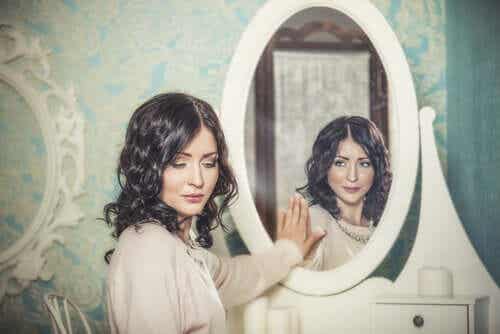Acne during adolescence is not only a cosmetic problem but also affects self-esteem as it causes great emotional distress. We present the main psychological effects.

Last update: May 28, 2022
During adolescence, every small imperfection, every aspect of oneself that deviates slightly from the norm risks generating great anguish and a strong sense of inferiority. This is what happens with the appearance of pimples and acne. Although it is a common imperfection, the psychological effects of juvenile acne should not be underestimated.
This condition tends to manifest itself with the onset of puberty due to hormonal imbalances. It is estimated that around 80% of young people between the ages of 12 and 18 suffer from acne and that in many cases it can last into adulthood, especially in women.
Although it is not a serious illness, it can cause emotional and social distress. In the following lines we analyze in detail the psychological effects of juvenile acne.
The psychological effects of acne on self-image
Adolescence is a phase of research, transformation and formation of identity. In this process self-image acquires great importance as a means used by young people to show themselves to the world.
Through their appearance they can project attitudes, tastes and preferences and merge with the group. For this reason, it is common for teens to dress very similar to their friends or change their appearance when they change groups.
Acne contributes to a negative perception of self-image, as it generates rejection and lower self-esteem. Nowadays this feeling is heightened by the numerous retouched, filtered and unreal images that abound on social networks.
In the case of juvenile acne, the adolescent feels that he cannot rely on his appearance to present himself to the world; in reverse, it becomes an element that causes shame and constant discomfort.
Interpersonal rejection among the psychological effects of juvenile acne
If self-image is essential during adolescence, the peer group is even more so. Peers become a point of reference and shelter; socialization is essential at this stage e feeling accepted is crucial for correct emotional development.
Acne can become a reason for rejection, teasing or criticism. In light of this, it makes it difficult to build friendships and very important first romantic relationships during adolescence. Acne sufferers can feel humiliated and excluded; in some cases, moreover, it is not just a sensation, but a reality.
Juvenile acne mainly affects the face, so it is very evident. This makes it difficult to hide and being always present it constantly influences socialization.
Emotional effects
What has been described causes, in turn, different emotional effects that can manifest themselves in different ways:
- The teenager with acne suffers from low self-esteem and has a negative self-image. He doesn't like the way he looks, so he feels inferior or inadequate. Even after treating or resolving the acne problem, these emotional repercussions can persist, as adolescence is a critical period in building self-esteem.
- The embarrassment of acne can lead the young person to isolate themselves and to limit its socialization and leisure activities. Giving up on these stimulating opportunities can lead to apathy and negative emotional states; in severe cases it can even trigger depression.
- Anxiety disorders are also very common. Anxiety can lead the young person to desperately try to get rid of acne, resulting in skin lesions and subsequent signs. If the minor is particularly vulnerable, his discomfort is such as to affect academic performance and other areas of life. Social phobia is usually one of the most common consequences in these cases.
Reduce the psychological impacts of juvenile acne
This skin blemish is not just an aesthetic problem, as it is it profoundly affects emotional well-being, social relationships, academic performance and leisure time. Its impact can extend to virtually all areas of a young person's life.
For this reason, it is important do not underestimate the discomfort experienced by the adolescent with acne and seek help. Consulting a dermatologist and finding the right acne treatment is crucial. In addition to this, it is essential to deal with the psychological and emotional plane; the young person needs to express his insecurities and sufferings, as well as find support and understanding.
The family must help the teenager a build a solid self-esteem that is not based only on physical appearance; so as not to feel inferior to peers.
In the superficial world of social networks, and in the complicated (and sometimes cruel) phase of adolescence, the role of parents is fundamental to educate to values and correct emotional management.
Despite this, if the psychological impact of juvenile acne is high, it is advisable to undertake a psychotherapeutic path that can help the young person to deal with the problem.


























